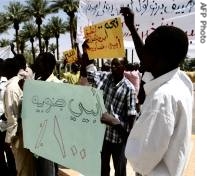2007年VOA标准英语-Tension Rises Between North, South Sudan Over A
搜索关注在线英语听力室公众号:tingroom,领取免费英语资料大礼包。
(单词翻译)
By Nick WadhamsNairobi
15 August 2007
The government of south Sudan says dialogue with the Sudanese government in Khartoum has completely broken down and a peace deal signed in 2005 is in jeopardy1. As Nick Wadhams reports from Nairobi, tension continues to rise over the disputed Abyei region, an area between the two that is rich in oil.
Leaders of the Sudanese People's Liberation Army will meet in the southern city of Juba on Friday to try to figure out how to revive the Comprehensive Peace Agreement, a landmark2 2005 deal that ended 21 years of civil war.

Members of Sudan's Dinka tribe from Abyei hold banners reading 'Abyei is 100 percent southern' (file photo)
But southern officials are warning that they believe the ruling party in the north, the National Congress Party, is refusing to implement3 the Comprehensive Peace Agreement. They say they have no desire to resume Africa's longest civil war, but warn that the north may leave them no choice.
Of serious concern is the Abyei region, which both sides claim. The Reuters news agency reports that about 30,000 people who had fled the civil war could not return home because of the continued dispute over Abyei.
The southern Sudanese envoy4 to Kenya, John Andruga Duku, says the north is no longer acting5 in good faith.
"The dialog between the SPLM and the National Congress has not produced any result. We have the feeling now that they are using the dialog as a delaying tactic6. We will not be the first ones to go back to war but we cannot accept to be pushed around without implementing7 the CPA. So to start the war, it will require very small mistake here and there. As we speak now, the situation is tense in Abyei and any slight mistake can trigger the situation back to war," he said.
The civil war was fought between the largely Christian8 Sudan People's Liberation Army in the south and the forces of the Sudanese government in the north, which is mostly Muslim. More than 1.5 million people died.
Last month, the United Nations said the north had missed a July 9 deadline to withdraw its troops from some areas of the south. U.N. officials later said that the SPLA had also missed the deadline to withdraw all its troops.
Duku warns the failure of the Comprehensive Peace Agreement could threaten efforts to bring peace to the Darfur region, to the west.
"What is the incentive9 for factions10 from Darfur to resolve the issue when they can see that the same government, they are not able to implement what they said they are going to do? So there will be no incentive for the Darfur group to go for agreement with this government," added Duku.
Leaders from both north and south say they are also awaiting the results of mediation11 efforts by Kenya's former president, Daniel Arap Moi, who was appointed envoy for the Sudanese peace process in July. He returned from Khartoum last weekend.
A chief mediator12 in the Sudanese peace talks who is accompanying Moi, Lieutenant13 General Lazarus Sumbeiywo, says they will visit Juba in September. He tells VOA that it's still far too early to talk about Moi's efforts having succeeded.
"Until I go there, I don't know, we'll have to get it from Juba, get the version of the south," he said. "We want to see peace prevail in southern Sudan. Peace and prosperity, peace and development, peace and harmony."
According to the peace deal, south Sudan gets six years of autonomy leading up to a referendum in 2011. Its people will then decide whether to secede14 from Sudan.
 收听单词发音
收听单词发音 




